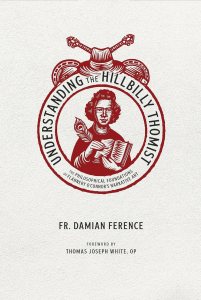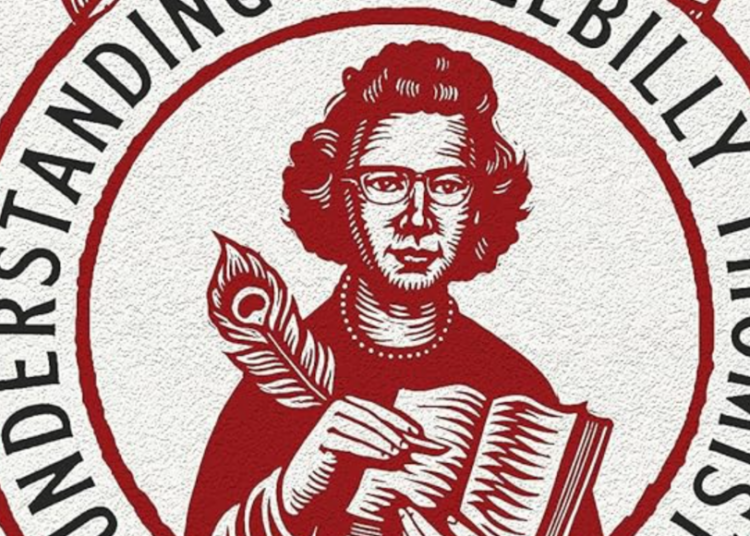An artist is precisely what Flannery O’Connor thought she was. As such, she was a maker, but not a creator. As Fr. Damian Ference puts it, she was a maker of things according to right reason. And reason, as O’Connor once put it, had “lost ground among us” as of the mid-twentieth century; hence the need for Saint Thomas.
Understanding the Hillbilly Thomist: The Philosophical Foundations of Flannery O’Connor’s Narrative Art, by Father Damian Ference (280 pages, Word on Fire Press, 2023)
 The year was 1955, and a barely thirty year old Flannery O’Connor was about to make her debut on national television. Wise Blood had already begun to make her a household name in more than a few households, and her first collection of short stories, A Good Man Is Hard to Find, was about to be released. Before making her way from Milledgeville, Georgia, to New York City and an NBC studio she mused to a friend that “everyone who has read Wise Blood thinks I’m a hillbilly nihilist, whereas I would like to create the impression over the television that I’m a hillbilly Thomist.”
The year was 1955, and a barely thirty year old Flannery O’Connor was about to make her debut on national television. Wise Blood had already begun to make her a household name in more than a few households, and her first collection of short stories, A Good Man Is Hard to Find, was about to be released. Before making her way from Milledgeville, Georgia, to New York City and an NBC studio she mused to a friend that “everyone who has read Wise Blood thinks I’m a hillbilly nihilist, whereas I would like to create the impression over the television that I’m a hillbilly Thomist.”
Whether or not she managed to create such an “impression” in the minds of the viewers that day will never be known, but reading Father Damian Ference’s “understanding” of O’Connor’s art and philosophy should remove any lingering doubts in the minds of his—and her—readers today.
In truth, Flannery O’Connor was neither a hillbilly nor a nihilist, but she was a Thomist. More than that, she was a Thomist who didn’t mind being thought of as a hillbilly Thomist, maybe even the hillbilly Thomist.
Think of that ordinary verb “make” in the opening paragraph. That single, simple verb captures Saint Thomas Aquinas’s most basic insight—and belief. We humans “make”; we do not create. Only God creates, and only God created ex nihilo.
Such an insight might even be regarded as a hillbilly insight. After all, one of Aquinas’s most insightful biographers, G.K. Chesterton, thought that the Thomistic philosophy was “nearer than most philosophies to the mind of the man in the street.” Or up in the hills, for that matter.
“Make”… an ordinary word for ordinary folks. And Flannery O’Connor was an ordinary woman of ordinary words. She was also a woman of ordinary faith and extraordinary writing talent, as well as one who possessed an extraordinary commitment to writing.
For that neighboring hillbilly, Tennessean Dolly Parton, it was “9 to 5” that demanded her attention; for Georgian Flannery O’Connor, it was only 9 AM to noon. Those were her writing hours. During that time it was writing or nothing. And some mornings it was nothing. But it was never writing and possibly something else. Writing or reading? Never.
A full-time practitioner of writing habits, Flannery O’Connor was a “full-time believer” in them as well. Doing without such habits might be possible, “if you’re a genius, but most of us only have talent.”
O’Connor was once asked why she wrote. “Because I’m good at it” was her prompt reply.
Why did she write about what she wrote about? Was she perhaps a nihilist after all? One might be excused for thinking just that upon reading Wise Blood for the first time. To be sure, Father Damian Ference disagrees, even though he tells us that Wise Blood painted a “terrifying picture… no make (there’s that word again) make that especially because that story captured a world “marked by self-centeredness, disregard of mystery, and subordination of reason.”
Big words all. Not exactly O’Connorian words, but words that this hillbilly would surely have understood. Ference then proceeds to borrow from O’Connor almost in order to explain himself: “Don’t think you have to abandon reason to be a Christian.” Or, “if you want your faith you have to work for it. It is a gift, but for very few is it a gift given without any demand for equal time devoted to its cultivation.”
For O’Connor, that cultivation included a minimum of twenty minutes a night devoted to reading Aquinas. While the “dumb ox” never invaded those three precious morning hours, he must have somehow seeped in often anyway: “I read a lot of theology because it makes my writing bolder.”
Bolder? Why bold at all? O’Connor again: “A serious fiction writer describes an action only to reveal a mystery.” And what could possibly be more mysterious than God’s creation?
Observing that creation was the starting point for St. Thomas. For him, all knowledge began with the senses. And knowing always preceded thinking. Or at least it should. If a certain 13th-century Dominican took that to heart, so did a 20th-century hillbilly Thomist. Artists, O’Connor knew—and ultimately thought—had a duty to be “humble in the face of what-is.”
And an artist is precisely what Flannery O’Connor thought she was. As such, she was a maker, but not a creator. As Ference puts it, she was a maker of things according to right reason. And reason, as O’Connor once put it, had “lost ground among us” as of the mid-twentieth century; hence the need for Saint Thomas.
As G.K. Chesterton had once put it, each age is converted by the saint that contradicts it most. If it had taken a Saint Francis to rescue a reason-soaked Victorian England, Saint Thomas was now on hand to bring a feelings-drenched America to its sense. This was not something that O’Connor felt or thought. Instead it was something that she knew.
O’Connor, Ference assures us, also knew that she was neither an evangelist nor an intellectual. “Evangelizing,” she advised, should be “left to the evangelists.” And writers should never fall prey to “intellectualism.” For that matter, O’Connor had a “horror of making” (yes, making) an idiot of myself with abstract statements and theories.”
This story teller could never be accused of anything like that. Nihilism maybe. But not that. For O’Connor, the novel was nothing more and nothing less than an “art form,” and when a writer uses it for anything other than that, “you pervert it.”
Still, Ference remains forever on hand in this book to make his case that O’Connor cannot be understood apart from her understanding of Thomas Aquinas. In effect, she trusted Aquinas to make the philosophical case for God, while she believed that God had willed that the truth of His existence had been made known by divine revelation.
As such, she called herself as a “13th century Catholic,” which Ference describes as a time when it was “virtually impossible not to believe in God.” As a twentieth century artist, O’Conner believed that the meaning of life remained “centered in our Redemption by Christ.”
And yet she saw herself, even then, as very much in the minority: “The general intelligent reader is not a believer.” Worse than that, she felt—even then—that “if you live today you breathe in nihilism.” What would she think today? For her then and always, the choice was really Catholicism or nihilism, and “if I were not a Catholic, I would have no reason to write.”
To be sure, Father Ference uses a number of O’Connor’s stories to make his case for the genuine impact of Thomas Aquinas on this faux-hillbilly. He also wants the reader to know something else that O’Conner knew, namely that it was “much harder to believe than not to believe.” Religion came with a cost. It was, after all, “the Cross,” and not a “big electric blanket.”
Written, one suspects, with two categories of readers in mind, Ference concludes that trying to understand O’Conner apart from her “hillbilly Thomism” would be akin to trying to understand the “New Testament apart from the Old Testament.”
Two categories? They would be both seasoned O’Conner veterans and untested O’Connor rookies. He then asks a favor of the veterans: “It would please me no end to know that after reading this book (that) you were able to go back and re-read some of your favorite O‘Conner stories.” And why not, especially since along the way he tells us that O’Conner herself took great pleasure in re-reading her own stories.
Somewhere between a grisly veteran and an innocent rookie myself, I can assure anyone and everyone that reading this book will be worth your time. If you are an O’Conner veteran, you cannot possibly make a mistake by giving some time and thought to this work. And if you are an O’Conner rookie, you won’t ever make (there I go again!) the mistake of so much as entertaining the thought that the author of Wise Blood might be mistaken for a nihilist, whether of the hillbilly variety or otherwise.
The Imaginative Conservative applies the principle of appreciation to the discussion of culture and politics—we approach dialogue with magnanimity rather than with mere civility. Will you help us remain a refreshing oasis in the increasingly contentious arena of modern discourse? Please consider donating now.
The featured image


